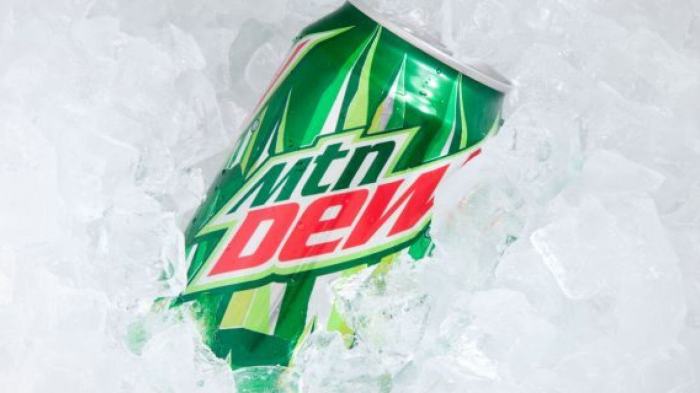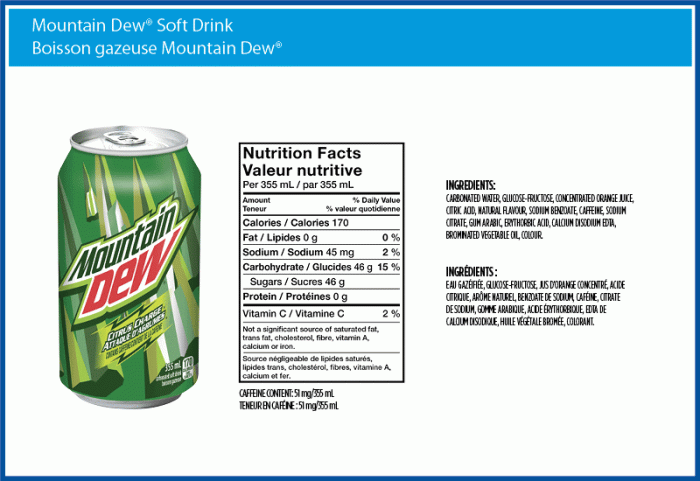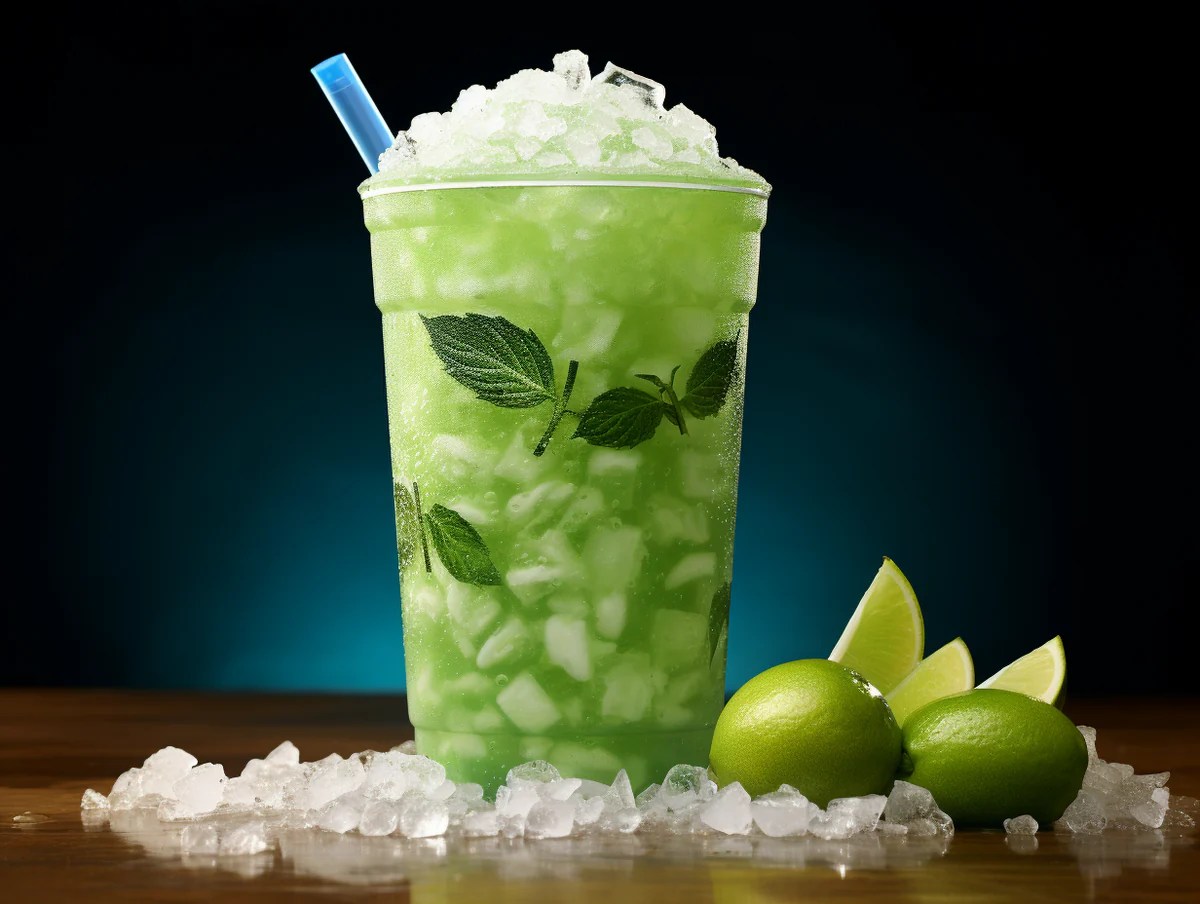Introduction to Mountain Dew

Diet mt dew nutrition facts – Mountain Dew, a carbonated soft drink, boasts a long and interesting history, evolving from a regional beverage to a globally recognized brand. Its distinctive citrus flavor and high caffeine content have cemented its place in popular culture, particularly among younger demographics. Understanding its evolution and marketing strategies provides insight into its enduring success.The origins of Mountain Dew trace back to 1940 in Knoxville, Tennessee, where it was created by Barney and Ally Hartman.
Initially marketed as a mixer for whiskey, its unique flavor profile gradually gained popularity as a standalone soft drink. The brand experienced several ownership changes before ultimately becoming part of the PepsiCo beverage portfolio. This acquisition significantly expanded Mountain Dew’s reach and resources, propelling its growth into a major player in the soft drink market.
Mountain Dew’s Marketing and Target Audience, Diet mt dew nutrition facts
Mountain Dew’s marketing has consistently focused on targeting adventurous and rebellious youth, and young adults. The brand’s advertising campaigns often feature extreme sports, action-packed visuals, and edgy music, effectively associating the drink with a sense of excitement and thrill-seeking. This carefully cultivated image resonates with the target demographic, creating a strong brand identity that transcends mere refreshment. This strategy is evident in their long-standing association with sponsorships of extreme sports events and athletes, further solidifying their connection with a youthful, adventurous audience.
More recently, the brand has also expanded its marketing to include online and social media campaigns, engaging directly with its target demographic through interactive content and influencer partnerships.
Mountain Dew Flavors and Product Lines
Mountain Dew’s original citrus flavor remains its flagship product. However, over the years, the brand has expanded its portfolio to include a wide range of flavors and variations. These include diet versions, such as Diet Mountain Dew, catering to health-conscious consumers, and various limited-edition flavors introduced seasonally or in response to trending tastes. The brand also offers different product formats, such as cans, bottles, and larger multi-serve packaging.
Some notable examples of flavor variations include Code Red (cherry), Voltage (electric citrus), and Live Wire (a citrus-flavored energy drink). These diverse offerings allow the brand to cater to a wider range of consumer preferences and maintain its appeal in a dynamic market. The introduction of new flavors often leverages current trends and popular tastes, ensuring the brand remains relevant and exciting for its target audience.
Impact on Diet and Health: Diet Mt Dew Nutrition Facts

Mountain Dew, in both its regular and diet formulations, presents a complex relationship with diet and overall health. While offering a temporary energy boost, its high sugar content (in the regular version) and artificial sweeteners (in the diet version) raise concerns regarding long-term health consequences. This section explores the impact of Mountain Dew consumption on weight management, dental health, and energy levels.
Weight Management
The impact of Mountain Dew on weight management differs significantly between the regular and diet versions. Regular Mountain Dew, with its high sugar content and substantial caloric density, contributes significantly to weight gain if consumed regularly as part of a diet exceeding caloric expenditure. The high fructose corn syrup, a key ingredient, is readily converted to fat by the liver.
Conversely, diet Mountain Dew, being calorie-free, might seem a healthier alternative. However, studies suggest that artificial sweeteners can disrupt gut microbiota, potentially affecting metabolism and potentially leading to weight gain in some individuals. The perception of zero calories can also lead to increased consumption of other high-calorie foods, negating any potential weight-management benefits. The long-term effects of artificial sweeteners on weight management remain a subject of ongoing research.
Dental Health
Both regular and diet Mountain Dew pose significant risks to dental health due to their high acidity. The low pH levels of these beverages erode tooth enamel, increasing the susceptibility to cavities and dental erosion. The prolonged exposure of teeth to acidic drinks weakens the enamel, making them more vulnerable to decay. Regular consumption of Mountain Dew, regardless of whether it’s regular or diet, significantly increases the risk of developing dental problems.
Watching your calorie intake? Diet Mountain Dew’s nutrition facts are readily available, but if you’re looking for a refreshing, lower-sugar alternative, check out the arnold palmer spiked nutrition facts to compare. You might be surprised by the differences! Remember to always check nutrition labels to make informed choices about your diet and beverage consumption.
Ultimately, managing your Diet Mt. Dew intake is key to a healthy lifestyle.
This is because the acidity of the drink attacks the enamel, creating micro-abrasions that can eventually lead to serious damage. Proper dental hygiene, including regular brushing and flossing, is crucial to mitigate these risks, but it cannot completely negate the negative impact of frequent Mountain Dew consumption.
Energy Levels and Overall Well-being
Mountain Dew provides a rapid surge in energy due to its high caffeine content. This effect is temporary, often followed by a crash in energy levels. The artificial sweeteners and high acidity can also contribute to digestive discomfort, such as bloating and heartburn, negatively impacting overall well-being. While the initial energy boost might be appealing, the subsequent energy crash and potential digestive issues can lead to fatigue, irritability, and reduced overall productivity.
Furthermore, the lack of essential nutrients in Mountain Dew means it offers little in the way of sustained energy or nutritional benefits, potentially contributing to nutrient deficiencies if consumed frequently as a primary beverage. The combination of a sugar rush followed by a crash can also lead to mood swings and increased cravings for sugary foods.
Consumer Perceptions and Marketing

Mountain Dew’s marketing strategy has significantly shaped consumer perceptions and its overall brand identity. The brand has consistently cultivated a specific image, attracting a loyal following while also generating considerable debate regarding its health implications and marketing tactics. Understanding this interplay between marketing, perception, and consumer behavior is crucial to analyzing the product’s overall impact.Mountain Dew’s marketing campaigns frequently portray an image of energy, excitement, and extreme sports.
For example, long-standing associations with action sports, featuring athletes pushing their physical limits, project a sense of thrill and adventure directly linked to the product. These campaigns often utilize vibrant colors, fast-paced editing, and high-energy music to reinforce this energetic persona. The use of celebrity endorsements, particularly those associated with youth culture and rebellion, further solidifies this brand image.
Consider, for instance, past campaigns featuring musicians or actors known for their edgy personalities. This carefully constructed image resonates deeply with the target demographic.
Target Demographic and Perceptions
Mountain Dew’s primary target demographic is young adults, typically males aged 18-35, although its appeal extends to a broader audience. This demographic is often characterized by an active lifestyle, a preference for bold flavors, and a willingness to embrace risk-taking behavior. The brand’s association with extreme sports and adventurous lifestyles taps into this demographic’s desire for excitement and self-expression.
Perceptions of Mountain Dew within this group often center on its strong flavor profile and its association with fun and social activities. However, awareness of its high sugar and caffeine content is also prevalent, although this doesn’t necessarily deter consumption for many within this demographic. The perception of Mountain Dew as a “guilty pleasure” or a “reward drink” is quite common.
The brand’s edgy image also appeals to a sense of rebellion and individuality.
Hypothetical Responsible Consumption Marketing Campaign
A hypothetical marketing campaign focusing on responsible consumption could emphasize moderation and balance. Instead of solely focusing on the thrill and excitement, the campaign could incorporate messages promoting mindful enjoyment and active lifestyles. For example, advertisements could feature athletes engaging in extreme sports while also highlighting the importance of hydration and balanced nutrition. The campaign could showcase responsible consumption scenarios, such as enjoying a Mountain Dew as a post-workout reward instead of solely focusing on the product’s energy-boosting properties.
This approach could use social media influencers who promote healthy lifestyles and balanced choices. Furthermore, the campaign could incorporate clear and prominent labeling highlighting the product’s nutritional information, promoting informed decision-making. This would involve visually striking but factual information on the product’s sugar and caffeine content, along with suggestions for moderation. The campaign’s overall tone would be more responsible and informative, while still retaining the brand’s youthful energy.
Such a campaign would aim to shift the perception from a purely hedonistic product to one that can be enjoyed responsibly as part of a healthy and balanced lifestyle.
FAQ Compilation
Is Diet Mt Dew actually calorie-free?
While it’s marketed as calorie-free, Diet Mt Dew contains negligible calories, typically less than 5 per serving, but this can still add up with frequent consumption.
What are the artificial sweeteners in Diet Mt Dew?
Aspartame and acesulfame potassium are commonly used artificial sweeteners in Diet Mt Dew. The specific blend might vary depending on region and formulation.
Does Diet Mt Dew affect dental health?
Yes, like most carbonated drinks, Diet Mt Dew’s acidity can erode tooth enamel over time, increasing the risk of cavities. Good dental hygiene is crucial.
Are there any long-term health risks associated with consuming Diet Mt Dew?
Long-term studies on the effects of artificial sweeteners are ongoing. Some research suggests potential links to metabolic issues, but more research is needed to establish definitive conclusions. Moderation is always advised.
